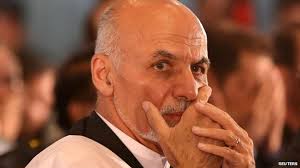Kabul – 08 April 2015 – David Loyn reporting for BBC News informs that presently even after one year has passed since the last presidential election took place, yet Afghanistan doesn’t have complete governmental figureheads.
It seemed like a carnival indeed, when on 5th of April in 2014, the world watched Afghan citizens arrive at the polls to cast their vote despite the adverse weather of heavy rainfall. However, the festive mood has led to disappointment at today’s scenario as “two-thirds of cabinet posts are still unfilled”.
In fact, sources say that the decision of President Ghani’s to fire the “provincial governors” along with the chiefs of the police is at the root cause of “the further stagnation of government across the country”. Consequently, the governor of the eastern Nangarhar province, having lost his required power to do his duty, resigned from his position.
Furthermore, the province of Nangarhar is situated in a critic place which can affect the security and revenue generation of the country. The said province is “the gateway to Afghanistan” which can be accessed from the eastern Khyber Pass. The issue at hand is that, the capital Jalalabad of the province of Nangarhar, is lately under the “increasing attacks” of Taliban along with other recent rebellious groups.
Therefore, a letter signed by numerous elders was sent to the Governor Mullah Ata Ullah Ludin, urging him “not to stand down”. The representative of the Nangarhar provincial citizens believe that he was the only person taking on the "criminal mafia".
However, at this juncture, the resignation of Mr. Ludin from this “important province” deprives the region from a responsible leader, much needed at this time of criminal attacks. Mr. Luding was only an “acting” figurehead, whereas in reality, he didn’t have the power to even appoint “new teachers”, so much so that his orders “to close a border weighing station was overturned”.
His order to close down a particular “border weighing station” was to check any illegal transactions as the trucks always left the country with “far heavier” load than the recorded figures. The conclusion of such results was an obvious involvement of bribe paid to adjust the difference. Moreover, the heavy weights of the vehicles were also “damaging the region's roads”.
Mullah Ata Ullah Ludin also fears that if the issue with the “acting governors and police chiefs” are to remain for a longer period of time, the people of the country could "slide towards instability; people will lose faith in the government and corruption will increase". The gateway of Iran, being the Herat province, situated at the western border of Afghanistan, connected with one of the “most important trade route”, too had a similar story.
Based on the present scenario, Ismail Khan, the former governor, is launching active campaigns against the government run by President Ghani. Moreover, the present president is even losing his support system.
The reason behind this governmental downfall, says Helai Ershad, is the decision of sharing the “power with Abdullah Abdullah”. She questions:
It seemed like a carnival indeed, when on 5th of April in 2014, the world watched Afghan citizens arrive at the polls to cast their vote despite the adverse weather of heavy rainfall. However, the festive mood has led to disappointment at today’s scenario as “two-thirds of cabinet posts are still unfilled”.
In fact, sources say that the decision of President Ghani’s to fire the “provincial governors” along with the chiefs of the police is at the root cause of “the further stagnation of government across the country”. Consequently, the governor of the eastern Nangarhar province, having lost his required power to do his duty, resigned from his position.
Furthermore, the province of Nangarhar is situated in a critic place which can affect the security and revenue generation of the country. The said province is “the gateway to Afghanistan” which can be accessed from the eastern Khyber Pass. The issue at hand is that, the capital Jalalabad of the province of Nangarhar, is lately under the “increasing attacks” of Taliban along with other recent rebellious groups.
Therefore, a letter signed by numerous elders was sent to the Governor Mullah Ata Ullah Ludin, urging him “not to stand down”. The representative of the Nangarhar provincial citizens believe that he was the only person taking on the "criminal mafia".
However, at this juncture, the resignation of Mr. Ludin from this “important province” deprives the region from a responsible leader, much needed at this time of criminal attacks. Mr. Luding was only an “acting” figurehead, whereas in reality, he didn’t have the power to even appoint “new teachers”, so much so that his orders “to close a border weighing station was overturned”.
His order to close down a particular “border weighing station” was to check any illegal transactions as the trucks always left the country with “far heavier” load than the recorded figures. The conclusion of such results was an obvious involvement of bribe paid to adjust the difference. Moreover, the heavy weights of the vehicles were also “damaging the region's roads”.
Mullah Ata Ullah Ludin also fears that if the issue with the “acting governors and police chiefs” are to remain for a longer period of time, the people of the country could "slide towards instability; people will lose faith in the government and corruption will increase". The gateway of Iran, being the Herat province, situated at the western border of Afghanistan, connected with one of the “most important trade route”, too had a similar story.
Based on the present scenario, Ismail Khan, the former governor, is launching active campaigns against the government run by President Ghani. Moreover, the present president is even losing his support system.
The reason behind this governmental downfall, says Helai Ershad, is the decision of sharing the “power with Abdullah Abdullah”. She questions:
"Two different mentalities, how can they work under the same umbrella?"



















